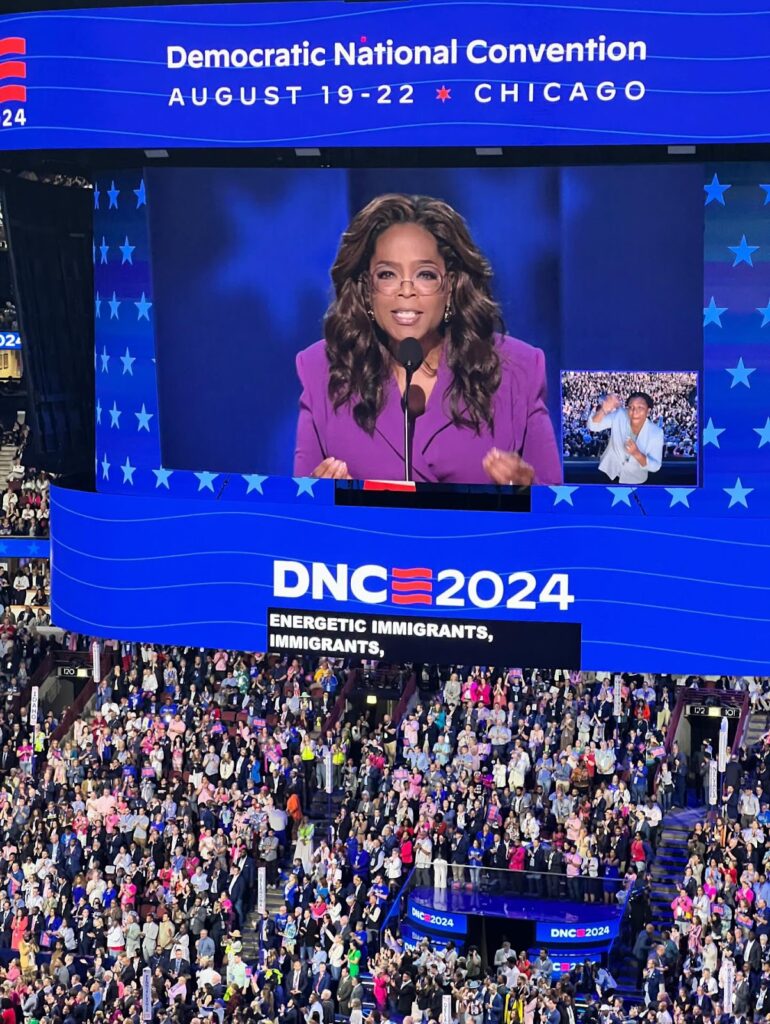
The 2024 Democratic National Convention (DNC), which took place from Aug.19-22, featured not only politicians and the families of both Democratic presidential candidate Kamala Harris and vice presidential candidate Tim Walz but a notable number of entertainment industry figures.
Actress Kerry Washington, singer John Legend, actress and writer Mindy Kaling and talk show host Stephen Colbert each hosted a different night of the convention. There were also several performances from artists like Lil Jon, Legend, Patti LaBelle, Common and Stevie Wonder.
DJ Cassidy, a music producer known for his work at celebrity events like Beyoncé and Jay Z’s wedding in 2008 and former President Barack Obama’s 2009 inauguration, also performed. He led the DNC in an untraditional roll call vote where he played songs specific to each state.
Cassidy’s roll call brought energy to the typically formal process where delegates from each state cast votes to nominate their party’s presidential candidate.
Ericka Blount, a culture journalist and journalism professor at Howard’s School of Communications, found that the roll call added something she had never seen before at the DNC.
“It also just represents where the country is, you know where we want to go in terms of inclusion, because the music represented inclusion, the people who spoke represented inclusion,” Blount said. “Everybody was represented, and I think everybody felt seen as a result.”
X users made light of the musicality of the convention, comparing it to music festivals like Rolling Loud and Coachella. According to Blount, the diversity, culture and use of music at the DNC reflected different groups of people, something she said the Republican National Convention (RNC) did not do to the same degree.
“We heard from all different kinds of people from all different walks of life,” Blount said. “And so that was a stark contrast to what we saw in the RNC, where it was not as diverse.”
Also in attendance and bringing diversity from their respective backgrounds to the DNC were Oprah, comedian Kenan Thompson and Golden State Warriors Head Coach Steve Kerr. He highlighted the connection between politics and his role in sports.
“The joy, the compassion, the commitment to our country that we saw at the Olympics, that is what Kamala Harris and Tim Walz have. And it is what our country needs,” Kerr, who has spent the last three years as head coach of the U.S. men’s olympic basketball team, said. “Leadership, real leadership, not the kind that seeks to divide us, but the kind that recognizes and celebrates our common purpose.”
Tony Goldwyn, who starred with Washington in the hit TV show “Scandal” also spoke at the DNC. In addition to teaching the audience how to properly pronounce Harris’ first name with the vice president’s two grandnieces, Washington connected her character in “Scandal” to the importance of voters.
“I know that I am the one standing on this stage, but I am not the lead character in this story. You are,” Washington said. “You are the messengers, you are the fixers. Dare I say it, you are the Olivia Popes.”
Blount said the U.S. is “obsessed with celebrities,” which elevates their platforms and political influence. She referenced the rumors about Beyoncé or Taylor Swift showing up at the convention, and how much that would have the potential to sway voter decisions.
“It’s a good thing for them to use their platform, whether it’s LeBron or whether it’s Beyoncé or Dolly Parton,” Blount said. “I think if you have that platform and you have a specific grievance or opinion about something political, it’s a good thing to be able to voice that opinion.”
The presence of these figures at the DNC indicates a larger connection between pop culture and politics. Kyle Williams, first-year political science major, said this was one of the few years he’s paid attention to the DNC.
“The reason I tuned in to it at first was because, typically, it is just a formality. There’s no real things going on,” Williams said. “But I tuned into it this year because there were things going on, there’s events, there’s culture.”
When thinking about celebrity relationships with politicians, Williams said some connections happen naturally, while others involve pandering, using the relationship as an ulterior motive to gain voter support.
“I think there’s a fine line between pandering and connecting,” Williams said. “And I think Donald Trump does a good job of showing that line, especially with [rappers] Kodak Black and OT7 Quanny as well.”
Blount noted that in the past, newspapers once endorsed candidates to sway the public, but now people also look to influencers and celebrities to validate them. She said students should continue to think critically about politics.
“Pop culture is a part of it, but I think you have to question what’s not being said. Like what people were not allowed to speak?” Blount said. “So for instance, the Palestinian people who asked to have a platform to talk around Gaza, were not allowed to speak. What else was not or is not being talked about?”
Similar to Blount’s advice for students to think critically about politics, Williams also said students, who often make and partake in pop culture, should be mindful of how they engage with celebrities and political figures.
“Especially with Kamala coming to visit, seeing yourself on an Instagram post from the VP, be mindful of how you are being used in that sense. But also be proud to say ‘I am a part of that,’” Williams said.
Copy edited by Anijah Franklin









